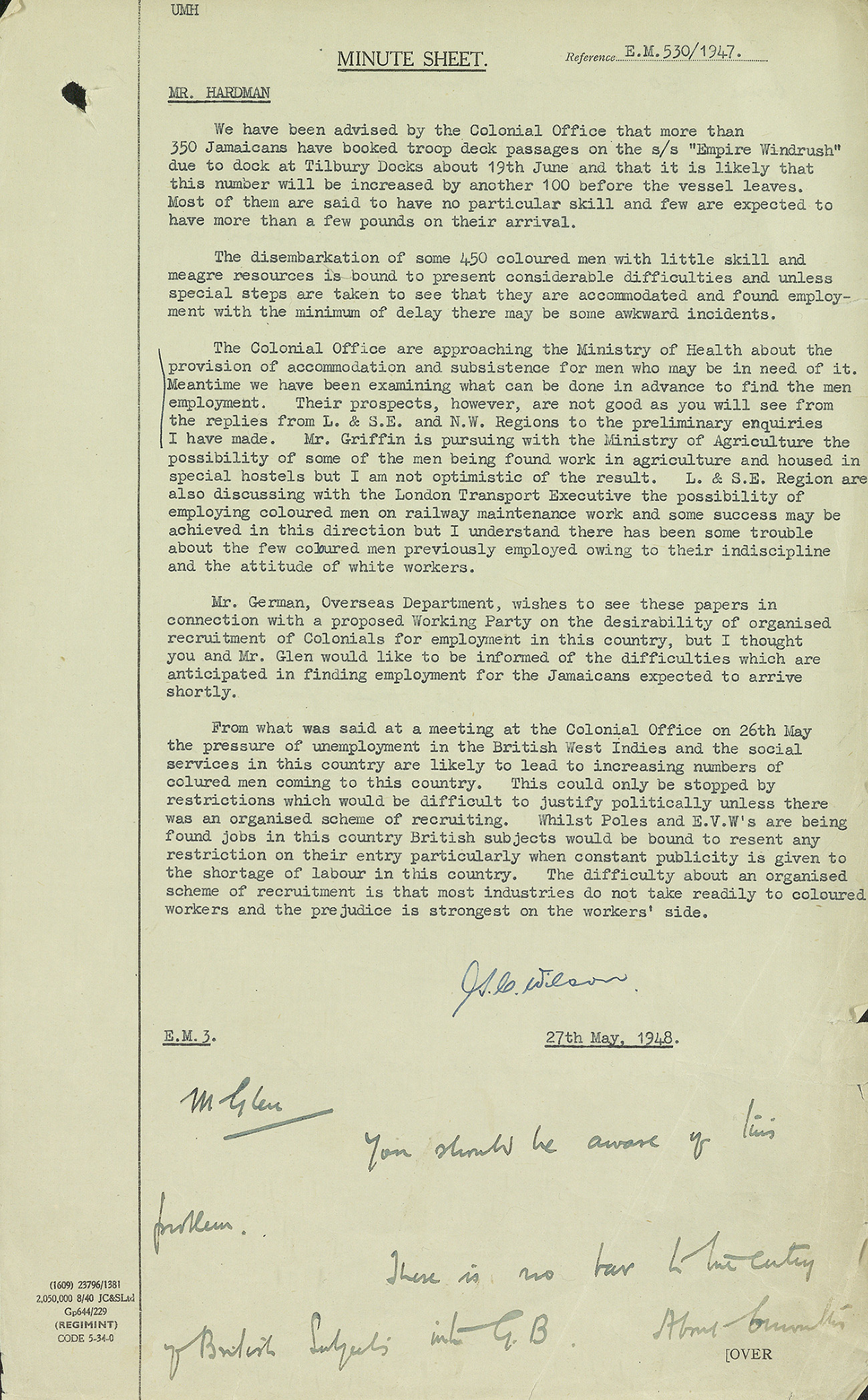
This document, dated 27 May 1948, comes from a file that includes discussions about finding work for the first Commonwealth immigrants after the arrival on the HMT Ormonde with 100 Jamaicans in 1947 and the bookings for a further 300 to come on the Empire Windrush. It reveals opposition from the unions and management to hiring Black workers in various industries, including the Merchant Navy, brickworks, agriculture, and dockyards. Catalogue ref: LAB 8/1499
Contains original language used at the time, which is not appropriate today.
- What steps did government departments take to prepare for increased immigration?
- Why had immigration increased, according to the document?
- Apart from Commonwealth immigrants, which other individuals came to work in Britain?
- How would you describe the tone and attitude of the document towards immigration?
Transcript
MINUTE SHEET
MR. HARDMAN
We have been advised by the Colonial Office that more than 350 Jamaicans have booked troop deck passages on the s/s “Empire Windrush” due to dock at Tilbury Docks about 19th June and that it is likely that this number will be increased by another 100 before the vessel leaves. Most of them are said to have no particular skill and few are expected to have more than a few pounds on their arrival.
The disembarkation of some 450 coloured men with little skill and meagre resources is bound to present considerable difficulties and unless special steps are taken to see that they are accommodated and found employment with the minimum of delay there may be some awkward incidents.
The Colonial Office are approaching the Ministry of Health about the provision of accommodation and subsistence for men who may be in need of it. Meantime we have been examining what can be done in advance to find the men employment. Their prospects, however, are not good as you will see from the replies from L. [London] & S.E. and N.W. Regions to the preliminary enquiries I have made. Mr. Griffin is pursuing with the Ministry of Agriculture the possibility of some of the men being found work in agriculture and housed in special hostels, but I am not optimistic of the result. L. & S.E. Region are also discussing with the London Transport Executive and the possibility of employing coloured men on railway maintenance work and some success may be achieved in this direction, but I understand there has been some trouble about the few coloured men previously employed owing to their indiscipline and the attitude of the white workers.
Mr. German, Overseas Department, wishes to see these papers in connection with a proposed Working Party on the desirability of organised recruitment of Colonials for employment in this country, but I thought you and Mr. Glen would like to be informed of the difficulties which are anticipated in finding employment for the Jamaicans expected to arrive shortly.
From what was said at a meeting at the Colonial Office on 26th May the pressure of unemployment in the British West Indies and the social services in this country are likely to lead to increasing numbers of coloured men coming to this country. This could only be stopped by restrictions which would be difficult to justify politically unless there was an organised scheme of recruiting. Whilst Poles and E.V.W’s [European Voluntary Workers] are being found jobs in this country, British subjects would be bound to resent any restrictions on their entry particularly when constant publicity is given to the shortage of labour in this country. The difficulty about organised scheme of recruitment is that most industries do not take readily to coloured workers and the prejudice is strongest on the worker’s side.
G. C. Wilson
27th May 1948
[Hand-written annotation]:
Mr. Glen: You should be aware of this problem.
There is no bar to the entry of British subjects into G.B. above…
